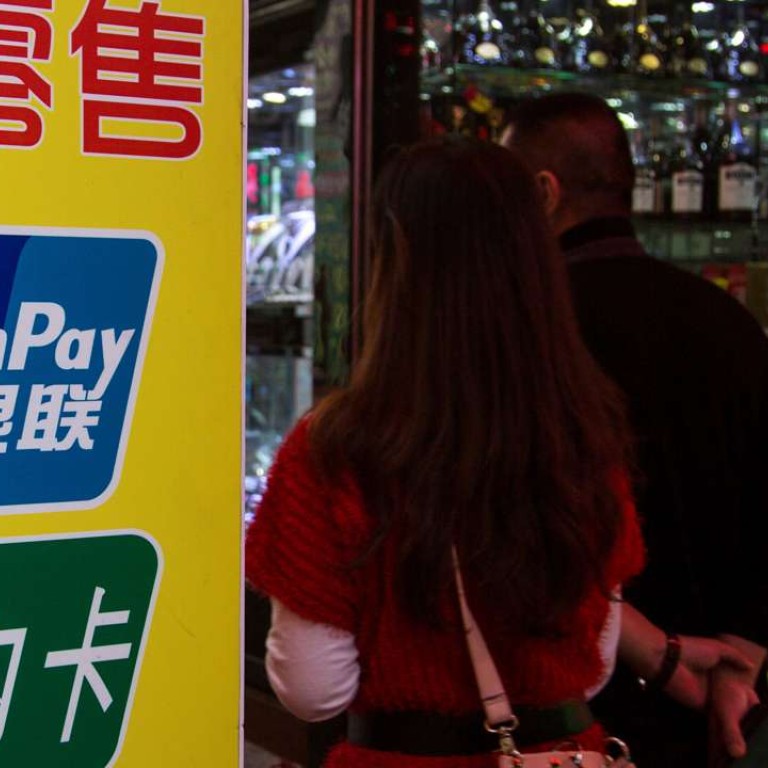
Update | Hong Kong stocks fall as casinos hit by Macau cash withdrawal limit report
Hang Seng Index eases 0.44 per cent to close at 22760.94
Hong Kong’s stock market closed lower on Friday led by casino shares which were hit hard after the South China Morning Post’s exclusive report on the upcoming limit on UnionPay users’ ATM withdrawals in Macau.
The Hang Seng Index dropped 0.44 per cent to close at 22760.9 on Friday, while the Hang Seng China Enterprises Index was down 0.29 per cent to 9,867.9.
Casinos were the worst performers, with Sands China, one of the most heavily traded stocks of the day, dropping 7.87 per cent to HK$34.55 and Galaxy Entertainment Group also slumping over 7 per cent to close at HK$35. Wynn Macau declined 7.1 per cent and SJM Holdings was knocked lower by 5.59 per cent.
The plunge in casino shares came after the Post reported that Macau was preparing to slash in half the amount of cash China UnionPay bank card holders can withdraw from ATM machines in the gambling hub, effective Saturday.
The daily withdrawal limit will be cut from 10,000 to 5,000 patacas, after as much as 10 billion patacas in China UnionPay ATM withdrawals were made in one month alone, according to the report.
UnionPay and the Macau Monetary Authority denied the report later on Friday.
Andrew Sullivan, a sales trader with Haitong International Securities, said the bombed out casino stocks could offer a good entry point for buying as the gambling industry gravitates towards new income streams geared towards entertainment.
“The reality is that people going to Macau will not rely on being able to take money out of the ATM,” Sullivan said. “It could be a buying opportunity as Macau looks to move more towards resort and MICE [meetings, incentives, conferencing, exhibitions] revenues.”
The tightened cap follows news earlier in the week that Macau’s tourism authority may require inbound travellers to disclose cash holdings of more than 120,000 patacas when entering the gambling hub.
The reality is that people going to Macau will not rely on being able to take money out of the ATM
“It is absolutely negative news for Macau casino players if it is true,” said Sophie Lin, a credit analyst at S&P Global Ratings.
But she said that from a longer term point of view, Macau’s gambling industry is set for recovery as better infrastructure and new casinos will help boost revenue from a broader market of middle class gamblers, but she is still concerned for the high-end or VIP segment, which is more sensitive to regulation and rules.
Among other heavily traded shares on Friday, HSBC Holdings rose 0.6 per cent to HK$65.75, Tencent Holdings fell 1.4 per cent to HK$188.2 and China Unicom added 2 per cent to close at HK$9.7.
On the mainland, the Shanghai Composite Index advanced 0.54 per cent to close at 3,232.8 while the CSI 300 — which tracks large companies listed in Shanghai and Shenzhen — added 0.68 per cent to 3,493.7.
The Shenzhen Component Index lost 0.21 per cent to 10, 789.6 while the Nasdaq style ChiNext dropped 0.7 per cent to 2,099.9.
Meanwhile, China’s producers’ price index surged 3.3 per cent year on year in November, its biggest rise since October 2011.
“Reflation is a global trend, China will not be an exception,” said Deng Qinghai, chief economist at JZ Securities.
“More importantly, the recovery of PPI is an important signal, which is expected to last into the next two months and is likely to rise above 4 per cent next January,” said Deng.
Across Asian markets, Tokyo’s Nikkei 225 added 1.23 per cent to 18,996.3, Sydney’s S&P/ASX 200 rose 0.31 per cent to 5,560.6 and the Kopsi index in South Korea fell 0.31 per cent to close at 2024.7.

